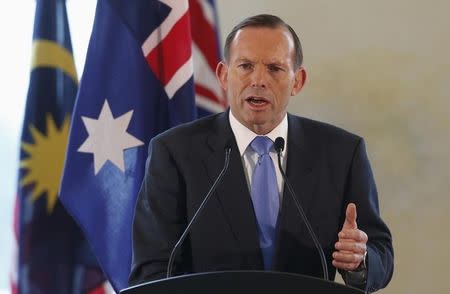Australia says forces sent to Iraq standing idle in UAE over legal status

By Matt Siegel SYDNEY (Reuters) - Australian Prime Minister Tony Abbott said on Wednesday that 200 special forces sent to battle Islamic State militants in Iraq had not entered the country because Baghdad had not offered them sufficient legal protections. Australian fighter jets began hitting targets inside Iraq earlier this month as part of the U.S.-led coalition to beat back the radical group, which has in recent days made advances at the north Syrian town of Kobani and in western Iraq. U.S. President Barack Obama met on Tuesday with military leaders from 20 countries including, Australia, Turkey and Saudi Arabia amid growing pressure for the U.S.-led coalition to do more to halt their advance. But the Australian troops, intended to conduct "advise and assist" missions with the Iraqi army, had been idle in the United Arab Emirates since mid-September because, Abbott said, a formal agreement on their legal status could not be agreed. The Embassy of Iraq in Australia did not immediately respond to requests for comment. Abbott said that he was confident a deal would be reached, but it remained unclear why negotiations had dragged on so long and why Canberra was insisting on legal protections that other coalition partners seemed willing to forego. "I made it very clear to the prime minister in New York a couple of weeks ago that we were very keen to help," Abbott told reporters on Wednesday, referring to Iraqi Prime Minister Haider al-Abadi. "I made it crystal clear that our special forces are ready to go and there is an enormous amount of good that they can do inside Iraq. But we owe it to our special forces only to deploy them with the right legal protections." Abbott has been one of Washington's staunchest backers on military action in Iraq, supplying weapons to Kurdish rebels fighting IS militants and frequently referring to the group as a "death cult" and existential threat to the west. He has struck a strident foreign policy since taking office last year, while struggling to enact an unpopular domestic policy agenda containing large cuts to the social safety net that saw his popularity sink to record lows. The United States, Britain and Germany currently have military specialists operating in some capacity in Iraq without the type of formal Status of Forces Agreement that Australia appears to be demanding for its troops. Abbott may have been talking tough early on to leverage a reticent Washington into acting in Iraq, said John Blaxland, a fellow at the Australian National University's Strategic and Defence Studies Centre. Now, having accomplished that goal, Abbott may no longer feel the need to follow through with what he said would be an unpopular and unnecessary deployment. "I suspect a lot of advisers are suggesting that he look for reasonable explanations or excuses, if you like, for not going in with special forces," he told Reuters. "What was the purpose of us committing these troops in the first place? My sense is the major purpose was to bolster U.S. resolve to take action. Well, that's mission accomplished." The legal status of U.S. troops in Iraq was reported to be a major sticking point in negotiations leading to their withdrawal in 2011, with neighbouring Iran said to have pushed for a complete drawdown of American forces from the country. (Reporting by Matt Siegel; Editing by Nick Macfie)

